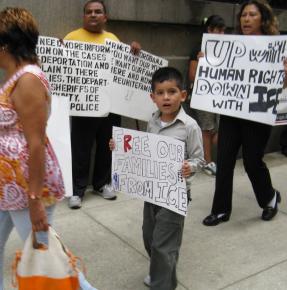The Chicago pol/ICE connection
Chicago is supposed to be a sanctuary city for immigrants, but the local police and federal immigration authorities have other ideas.
CHALLENGING THE gap between words and deeds in the city of Chicago's immigrant sanctuary policy, immigrant rights activists picketed City Hall August 5 as hearings were held on the Chicago police's collaboration with Immigration and Customs Enforcement (ICE).
Since 1985, city employees have been prohibited from enforcing federal immigration laws via an executive order issued by then-Mayor Harold Washington, later affirmed by the current mayor, Richard Daley. The policy was subsequently turned into law in 2006.
Despite this, however, at least 59 Latino residents have been placed in jail for months on "immigration hold" by ICE--after being initially stopped by the Chicago Police Department (CPD).
Chanting "We are humans, not aliens" and carrying signs demanding "Free our families from ICE," family members of those detained, plus activists from the March 10 Movement, Jewish Council on Urban Affairs, Chicago Sanctuary Alliance, RadioArte and International Socialist Organization marched prior to City Council hearings on police-migra connection.

"We're doing this to be vigilant on the immigrant families who are under attack from the police, who are illegally working with immigration," said Rev. José Landaverde, pastor of Our Lady of Guadalupe Mission, at a vigil the night before the hearings.
The police-ICE relationship, often referred to as the "poli-migra" by activists, has torn apart the lives of dozens of Latinos, some who have now been in jail for over five months after being stopped for traffic violations or booked on misdemeanors.
As the testimony showed, the poli-migra often trumped up charges to utilize loopholes in the sanctuary law, which allows for notifying ICE with arrests on felony charges, but not misdemeanors.
As Jorge Mújica, an activist with the March 10 Movement, explained at the hearing:
We have uncovered cases of harsh accusations, such as a DUI to a person who was not driving a vehicle, and "criminal trespass" to a worker after a gate was opened to him to enter a workplace. These kind of accusations imply that an immigrant who would have been freed on a $100 bond at the police station ends up instead in Cook County jail, where bonds are not accepted once ICE learns they are non-citizens.
This practice clearly has little to do with enforcing the law. But it is being used to terrorize the immigrant community. As his wife explained at a vigil before the hearings, Adolfo Guzman was arrested by the CPD for alleged battery, despite witnesses' statements exonerating him. Nevertheless, the CPD handed over Guzman to ICE. He isn't even able to attend his court date because of the immigration hold.
"One understands that when a law is broken, we have to pay for what we did," Guzman's wife said. "But my husband has done nothing illegal, so his being held prisoner does not make sense."
UNFORTUNATELY, THERE have been many cases like Guzman's. The net effect has been the loss of homes, tearing apart of families and the suffering of children when the primary breadwinners of their families are illegally detained.
The family of Maria Leon is one example. After her husband was stopped for driving without a valid license, he was jailed for five months on an immigration hold. As a result, Leon was forced to move into Our Lady of Guadalupe Mission with her two children. Landaverde, the pastor of the church, said the mission is struggling to help the Leons and numerous other families with food and diapers.
But the Mission has also provided a place to organize resistance to poli-migra. Family members of those illegally detained have joined with activists in the immigrant rights movement to compile a list of names of those held by ICE and deliver it to Chicago aldermen. Together, activists and the victims' families have demanded action to end the violation of the city's sanctuary policy.
As a result, the Chicago City Council's Human Relations Committee agreed to hold the August 5 hearing on the matter, and has pledged to investigate and end violations of the city's sanctuary policy. Even CPD representatives at the hearings promised to train officers on immigration policy and racial profiling.
This shift is an example of the importance of grassroots organizing. But what's needed is a dedicated sanctuary campaign by the city that informs undocumented workers of their rights. And activists must continue to organize for an end to ICE raids in city neighborhoods and workplaces.
While the hearings show that pressure from activism works, it's clear that supporters of immigrant rights have to keep up the pressure to make Chicago's sanctuary policy a reality.


